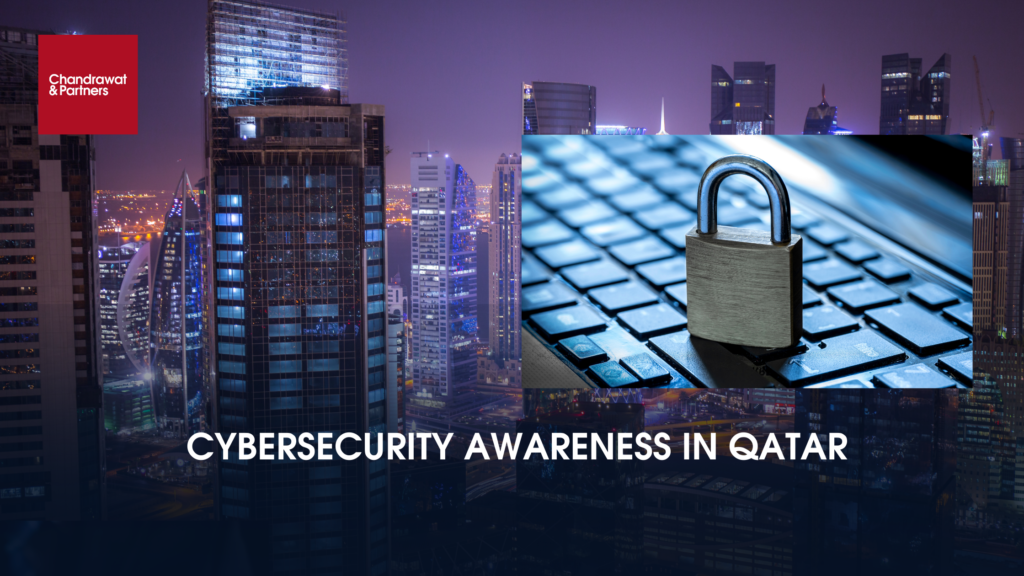
Jun 17, 2024
CYBERSECURITY AWARENESS IN QATAR
Qatar’s Growing Cyber Environment
One of the Middle East’s most technologically advanced countries is Qatar. The nation is making significant investments in smart city initiatives like Lusail City and incorporating cutting-edge technologies like “Blockchain”, the Internet of Things, and Artificial Intelligence (“AI”) into both public and private sector operations. More digital connectivity and more advanced platforms for administration, trade, and communication have resulted from these technical breakthroughs.
Initiatives for Cybersecurity in Qatar
Qatar has taken important measures to strengthen its cybersecurity framework and guarantee a safe and secure online environment for its enterprises and citizens in recognition of the threats including ransomware, social engineering, cyberattacks and data breaches:
- National Cybersecurity Strategy: Qatar has developed a comprehensive strategy to safeguard its digital infrastructure. It focuses on cybersecurity governance, risk management, and threat response, with the National Cybersecurity Agency (NCSA) coordinating efforts across both public and private sectors.
- Cybersecurity Training and Awareness: Universities like Qatar University and Hamad Bin Khalifa University (HBKU) offer specialized degrees in cybersecurity, and various initiatives help equip people with the skills to recognize and combat cyber threats.
- Public-Private Sector Collaboration: The government fosters collaboration between public and private sectors, including sharing threat intelligence, conducting joint exercises, and developing secure digital services to enhance national cybersecurity.
- Cybersecurity Laws and Regulations: Qatar has enacted laws like the Cybercrime Law to criminalize activities such as hacking and identity theft. The country also adheres to international cybersecurity standards and enforces data protection regulations to secure personal information.
The Role of Individuals in Cybersecurity Awareness
While the government and institutions are tasked with the responsibilities of securing the digital space and embedding the techniques that protect users, individuals also hold a very important position in sustaining cybersecurity. Here are some best practices that individuals in Qatar can adopt to secure themselves online:
Phishing schemes are perhaps the most relatively popular forms of cyberattacks wherein the attackers claim to be a trustworthy institution such as banks or government bodies to get people to provide sensitive personal information. In Qatar where e-bank offers and a lot of e-transactions are the order of the day, be careful of emails and even messages that you did not ask. Always check the source of the communication before navigating to links or giving out any information.
Passwords with strength and uniqueness are one of the simplest and yet effective methods of enhancing the security of online accounts. A password would be too long and abusive. They should be long and complicated since they are not the same for several accounts. When there is a password to each account, a password manager program can be used to store them securely and make it less likely that the accounts will be hacked. Furthermore, two-factor authentication (2FA) should be enabled which adds an extra step by sending a code to your mobile number or email so that it is very unlikely that unauthorized persons may log in to the account even if they have the password.
Keeping software up to date is essential to maintaining a secure digital environment. Cybercriminals frequently target weaknesses in outdated systems, so regular updates to your operating systems, browsers, and apps help close security gaps that could be exploited. By promptly installing security patches and updates, you significantly reduce your exposure to potential threats.
Internet connections are abundant in today’s world, however, public ones such as cafes, hotels or airports are less secure and may expose your private data to risks. It is also advisable to refrain from any activity that involves sensitive data such as online banking or private accounts. If a connection to these networks is a must, then considering the option of a VPN would be viable. VPN will allow a layer of protection for the users’ data and traffic on the network which is very helpful when traveling.
The Future of Cybersecurity in Qatar
As Qatar continues its digital transformation, cybersecurity will only become more critical. The adoption of emerging technologies such as 5G, AI, and IoT will undoubtedly bring new opportunities, but they will also introduce new vulnerabilities. Thus, it is essential for both the government and the private sector to continuously innovate and stay ahead of cyber threats.
In the coming years, Qatar will likely continue to expand its efforts to enhance cybersecurity awareness, not just for large corporations and government agencies but also for everyday citizens. Empowering the population with the knowledge and tools to navigate the digital world securely will be pivotal in building a safe, connected future for Qatar.
Conclusion
Cybersecurity is no longer just a technical issue—it’s a societal issue. In Qatar, where the digital ecosystem is growing rapidly, cybersecurity awareness is vital for ensuring the safety and integrity of the nation’s infrastructure, businesses, and personal data. By focusing on education, collaboration, and the adoption of strong cybersecurity measures, Qatar can continue to thrive as a leader in digital innovation while safeguarding its citizens and organizations from the evolving threat of cybercrime.
As a nation, Qatar’s proactive approach to cybersecurity and its focus on raising awareness will play a crucial role in creating a resilient digital future. For individuals and organizations alike, understanding the importance of cybersecurity is no longer optional—it’s essential.
How we can help?
- Our team is dedicated to providing customized cybersecurity solutions to meet the specific needs of Qatar. With our expertise and experience.
- We offer comprehensive services aimed at fortifying cyber defences, mitigating risks, and ensuring the resilience of digital infrastructure.
- From conducting thorough risk assessments to implementing robust security measures and providing ongoing support and training.
- Our team is committed to empowering organizations in Qatar to assist with the complexities of the cybersecurity landscape with confidence and peace of mind.
For more information or queries, please email us at
[email protected]
Key Contact

Surendra Singh Chandrawat
Managing Partner

